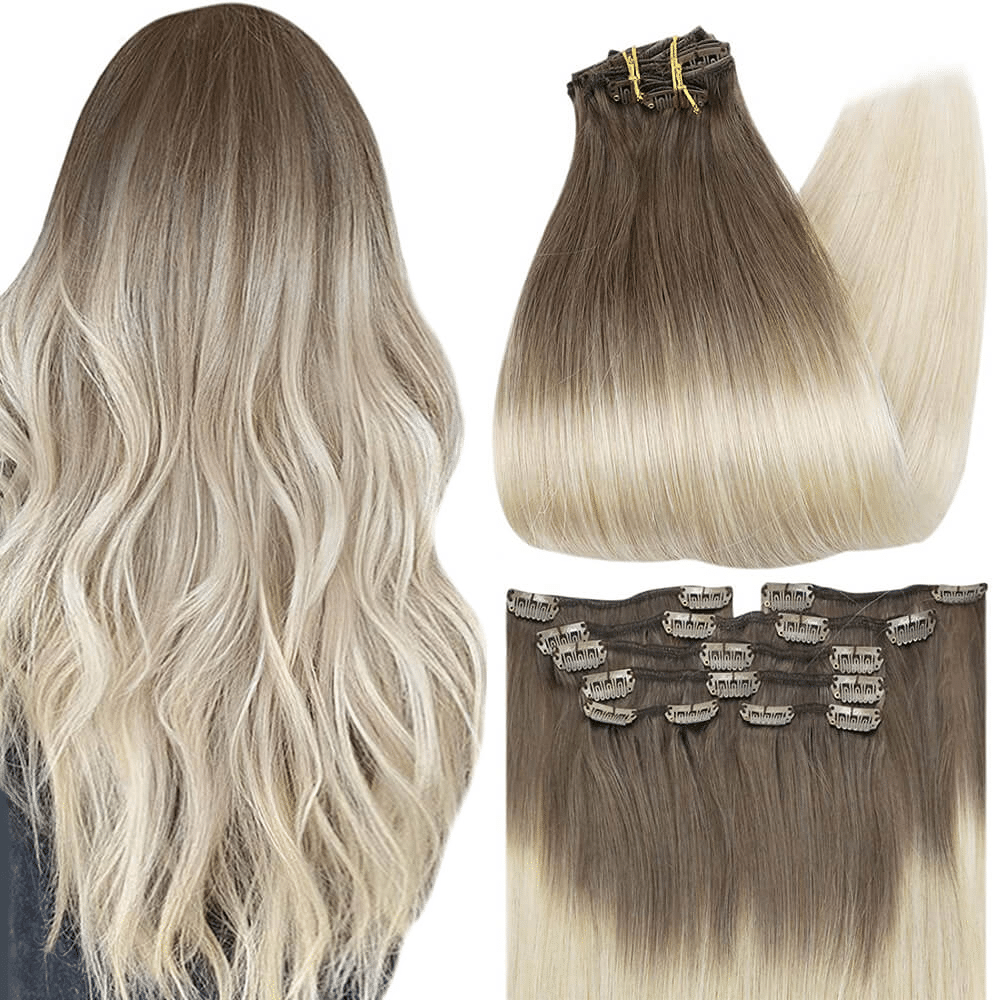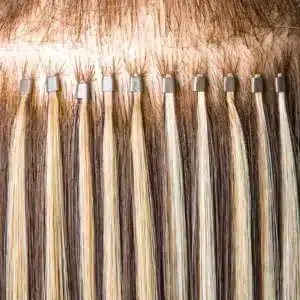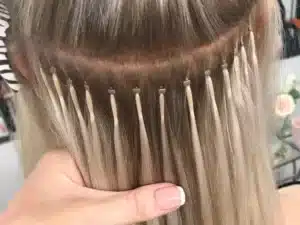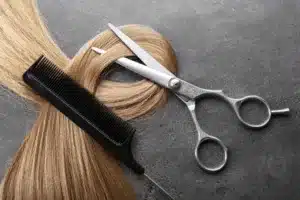Many clients want long, voluminous hair instantly without committing to permanent extensions. Salons often recommend clip-in hair extensions as a quick and flexible solution. But are they really the best choice?
Clip-in hair extensions have both pros and cons. They are non-damaging, affordable, and versatile, but they are not ideal for everyday wear or long-term use. Understanding both sides helps salons and clients make informed decisions.

For salon owners, wholesalers, and stylists, it’s essential to explain what clip-in extensions are, how they work, and why they might be the right—or wrong—option for different clients. Let’s explore this in detail.
What Are Clip In Hair Extensions?
Clients often confuse clip-ins with tape-ins or halo extensions. Clear definitions are important.
Clip-in hair extensions are temporary wefts of hair attached with small silicone-lined clips. The clips fasten securely to sections of the client’s natural hair, usually close to the scalp, and can be removed within minutes. They require no glue, heat, or beads, making them one of the simplest extension methods available.
Dive Deeper: How They Work
Application: Clients clip them in at home or stylists apply them in the salon within minutes.
Materials: They are available in synthetic and human hair, but salons focused on quality should only offer full cuticle, single-donor human hair clip-ins.
Sizes and Sets: They come in multi-piece sets (usually 7–10 wefts) or single wide pieces for extra volume.
Purpose: Ideal for occasional wear, such as weddings, parties, photoshoots, or daily styling for clients who do not want permanent methods.
FeatureDetailsAttachment methodClips sewn onto weftsRemovalInstant, no chemicals neededLifespan6–12 months with proper careStyling flexibilityCurl, straighten, or tone if 100% human hairBest forClients who want temporary transformation
Clip-ins are often sold as retail products in salons. They let clients experiment with extensions without investing in permanent installations.
Pros of Clip In Hair Extensions?
The advantages are what make clip-ins one of the most popular retail extension products worldwide.
Clip-in extensions provide instant results, require no professional installation, and protect natural hair from damage. They also serve as a gateway product for clients new to extensions.

Dive Deeper: Why Clients Love Them
Non-Damaging: No glue, heat, or chemicals. Hair stays safe.
Quick Application: Installed in under 10 minutes by clients themselves.
Cost-Effective: More affordable than permanent methods.
Versatile Styling: Add length, volume, or color highlights instantly.
Reusable: High-quality clip-ins can last up to a year.
Low Commitment: Perfect for those not ready for permanent extensions.
AdvantageExplanationEasy to useNo salon visit required for applicationBudget-friendlyOne purchase lasts for monthsFlexible for eventsIdeal for weddings, parties, or photoshootsSafe for natural hairMinimal stress on roots or scalp
For salons, clip-ins also generate strong retail sales while introducing clients to the concept of hair extensions.
Cons of Clip In Hair Extensions?
Every method has disadvantages, and clip-ins are no exception.
The main drawbacks are their temporary nature, visibility risk if not blended well, and potential discomfort when worn for long periods.
Dive Deeper: Common Limitations
Not Permanent: Must be reapplied every day.
Visibility Risk: Clips may be noticeable if not hidden under enough hair.
Discomfort: Can feel heavy or tight on the scalp if worn too long.
Less Secure: May slip out if not clipped correctly.
Hair Stress: Daily use of heavy clip-ins may cause traction over time.
LimitationImpactTemporary onlyNot ideal for clients wanting 24/7 wearStyling restrictionsSome updos expose clipsHeavier setsMay cause scalp soreness with long wearSynthetic hair optionsDo not blend or last like human hair
Stylists should advise clients that clip-ins are best used occasionally, not for daily, long-term use.

How To Put In Clip In Hair Extensions
Preparation
Clean and Dry Hair: Ensure the client’s hair is clean and dry before applying clip-in extensions. This helps the clips grip better and stay secure.
Sectioning: Divide the hair into small, manageable sections to allow for precise application and ensure the extensions blend seamlessly with the natural hair.
Application
Clip Placement: Start at the nape of the neck and work your way up. Open the clips and attach them to the roots of the natural hair.
Secure the Clips: Press the clips to close them securely. Make sure they are not too tight to avoid discomfort.
Blend the Hair: Once all the extensions are clipped in, blend the natural hair with the extensions using a comb or brush.
Aftercare
Advise on Removal: Instruct clients to gently open the clips and remove the extensions before sleeping or washing their hair.
Storage Tips: Recommend storing the extensions in a cool, dry place, preferably in a box or on a hanger to prevent tangling and maintain their shape.
Following these steps will help ensure a successful application and long-lasting, beautiful results for your clients.

How to Remove Clip In Hair Extensions
Preparation
Gather Tools: Ensure you have a fine-tooth comb and clips to section the hair.
Create a Comfortable Environment: Ensure the client is seated comfortably with all necessary tools within reach.
Removal Process
Locate the Clips: Find the clips in the extensions and gently open them.
Remove the Extensions: Carefully slide the extensions out of the hair, avoiding any pulling or tugging.
Comb Out Residue: Use a fine-tooth comb to detangle the natural hair and remove any residue from the clips.
Store the Extensions: Place the extensions in a storage container or hang them to keep them tangle-free and in good condition.
Aftercare
Inspect the Hair: Check for any signs of damage or breakage. Provide recommendations for treatments or products to strengthen and repair the hair if necessary.
Plan for Future Use: Discuss with the client their experienceand preferences regarding extensions. If they wish to use clip-in extensions again, provide any necessary care instructions.
By following these detailed steps, you can ensure a smooth and safe removal process for clip-in hair extensions, maintaining the health and integrity of your client’s natural hair.

Do Clip In Extensions Damage Your Hair?
One of the most common concerns is whether clip-ins are safe.
When used properly, clip-in extensions are one of the least damaging options. However, incorrect or excessive use may still cause problems.
Dive Deeper: Safety Factors
- Placement Matters: Avoid clipping in the same spot every day to prevent breakage.
- Weight Control: Fine-haired clients should use lighter sets.
- Removal Routine: Clip-ins must be removed before sleeping or swimming.
- Hair Type Consideration: Thicker hair tolerates them better than fragile hair.
Clip-ins are safe when used responsibly. Stylists should always educate clients on proper wear and care.
Are Clip-In Hair Extensions Worth It?
The value depends on client needs and expectations.
Clip-ins are worth it for clients who want an affordable, flexible, and temporary solution. They are not ideal for clients looking for permanent transformation.
Dive Deeper: Who Should Use Them
- Occasional Users: Weddings, travel, or special occasions.
- New Clients: First-time extension buyers testing the look.
- Budget-Conscious Clients: Affordable compared to permanent salon services.
- Salons: Great for upselling as a retail product.
Clip-ins are best positioned as a lifestyle product rather than a salon-exclusive service.

Is It Safe to Sleep With Clip-In Extensions?
Many clients forget to remove their clip-ins before bed.
It is not safe to sleep with clip-in hair extensions. Sleeping with them can cause tangling, scalp stress, and shorten their lifespan.
Dive Deeper: Why Removal Matters
- Movement at Night: Causes matting and knots.
- Root Stress: Pressure weakens natural hair follicles.
- Comfort Issues: Clips press against the scalp during sleep.
- Extension Damage: Constant friction reduces lifespan.
Educating clients on safe removal is key to maintaining both natural hair and the clip-ins.
My Opinion
From my perspective as a manufacturer, clip-in hair extensions are valuable as an entry-level luxury product. They give salons a retail solution that balances affordability and quality. However, I never recommend them as a permanent option. For salons that supply full cuticle clip-ins, they can serve as a great first step for clients before upgrading to tape-ins, I-tips, or wefts.
FAQ
How long do clip-in hair extensions last?
High-quality human hair clip-ins last 6–12 months with proper care.
Can clients dye clip-ins?
Yes, if made from full cuticle human hair. Synthetic cannot be dyed.
How many pieces are in a full set?
Typically 7–10 pieces for complete coverage.
Can clients heat style them?
Yes, human hair clip-ins can be curled, straightened, or waved.
Are clip-ins good for thin hair?
Yes, but lightweight sets are better for fine hair.
Can clients swim with clip-ins?
No, water can loosen clips and damage the extensions.
Do clip-ins require salon installation?
No, they are designed for self-application at home.
Are clip-ins reusable?
Yes, they can be reused many times with good care.
Do salons profit from clip-ins?
Yes, they make excellent retail add-ons for clients not ready for permanent methods.
Conclusion
Clip-in hair extensions are versatile, affordable, and safe for occasional use. They offer instant transformation, but they are not suited for daily permanent wear.
Hibiscus Hair Manufacturer has been dedicated to producing high-quality hair extensions for 25 years and is a recognized leader in the industry. If you are interested in finding a reliable hair extensions supplier and wholesale for your brand, please visit our website for more information:




